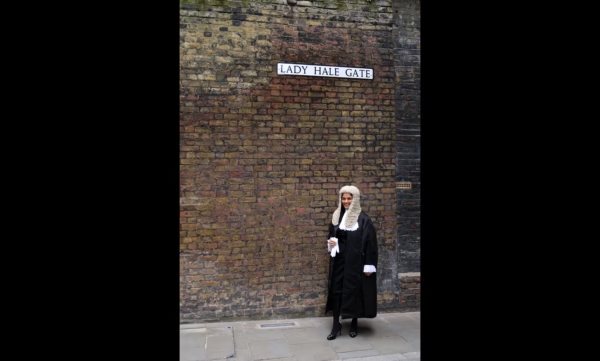
Dear Reader,
Welcome to the summer edition of the Property Newsletter from Hardwicke. In a bumper summer issue, Clare Anslow provides an update on the service of valid s.21 notices, Andy Creer provides insight into the recent Court of Appeal judgment on liability for Japanese Knotweed, Cameron Stocks reveals his untruth from last month’s unrobed section, and Patrick Sarson, teases us with his 3 facts, the answers to be revealed next month.
There will be no newsletter in August; we hope you have a good summer – whether enjoying time with the family or enjoying the peace and quiet in the office.
Save the dates! We have a number of seminars coming up in September onwards. Details of these are set out below.
Simon Allison- Editor
Activity Report - what the Hardwicke Property team have been up to
June saw Simon Allison appearing at another Tribunal hearing concerning recovery of the cost of replacing ACM cladding (decision expected shortly), drafting grounds of appeal with a view to over-turning Court of Appeal authority on operation of the Right to Manage statutory scheme, and advising on a case where a number of flats were sold to purchasers notwithstanding that they were subject to unilateral notices protecting potentially subsisting contracts for sale.
Lina Mattsson has been in trial and successfully established that her 84 year old client had the requisite intention to occupy premises under s 30(1)(g) of the 1984 Act. She has also been advising on numerous boundary disputes and prescriptive easements. And no, she did not watch Sweden being thrashed by England!
Charlotte John has spent far too much time thinking about tax this month, which saw her sitting the STEP taxation of trusts and estates paper. When she hasn¹t had her head in a tax textbook, she has been busy advising on breach of trust issues and the rights of beneficiaries to receive information, adverse possession of unregistered land, and a range of constructive trust and proprietary estoppel cases including two farming disputes.
This month Amanda Eilledge has been reading and re-reading Schedule 4 to the Land Registration Act 2002 for 2 different adverse possession cases but is mostly looking forward to her summer holiday in France cycling, drinking red wine and eating cheese.
This month Brie Stevens-Hoare QC seems to be disappearing into Court 10 with alarming regularity seeking injunctions. She has been dealing with a number of interesting issues including the appropriateness of mandatory injunctions, what is and what is not a mandatory injunction and the use of injunctions against unidentifiable persons unknown.
Alastair Redpath-Stevens is firmly of the view that the weather is such that it’s impossible to write anything without agreeing with Cassandra Mortmain that it ought to be done “sitting in the kitchen sink”: sadly, however, he outgrew most sinks (even with draining boards) some time ago. Nevertheless, advisory output has included a number of analyses, opinions and a wee spot of worriting about obscure leasehold extension and enfranchisement points. Oslo beckons…
In addition to the usual diet, Monty Palfrey had three TOLATA claims to advise on in a month together with a minor building dispute involving a property in south-west France. Unfortunately, only the surveyor got to have a site view.
This month Clare Anslow finished her secondment at a housing association and went straight into back-to-back trials in the County Court and FTT. Her most recent FTT case concerned technical issues with service charge demands which took place in a hotel in Essex – where the waiting area was the hotel beer garden. Clare is now looking forward to a week off before a busy August.
James Hall has been advising on an interesting question posed by a local authority as to swapping the use of two pieces of land given the presence of a restrictive covenant, and which also features a charities issue and an Inclosure award from the 19th century which he found via the National Archives!
When not dealing with claims for new business tenancies, Andrew Skelly has been advising on professional negligence and misrepresentation, where a purchaser of a nice little bungalow has discovered that they have actually bought a garage.
Cameron Stocks has spent the majority of the month seconded to a housing association working on a broad range of matters including service charges, boundary disputes, shared ownership leases and overcrowding. When not on secondment, Cameron spent two days in a service charge trial in Birmingham and advised on mortgage terms following the death of a mortgagee.
This month, Jamal Demachkie has been on a tour of the courts and tribunals: A couple of High Court applications, an FTT service charge dispute, an FTT adverse possession claim, two county court trials on injunctive relief, and a Pubs Code arbitration. He also provided a webinar on waiver of the right to forfeit.
And finally, Laura Tweedy is really enjoying her return to work. She’s been dealing with all sorts: Rent Act tenancies, service charges, forfeiture, the current s21 pitfalls, AGAs, injunctions, possessions and everything in between.
Articles
Intro text to Articles section goes here.




Did you see? You may have missed..........
Lina Mattson looks at some recent cases.
Avon Ground Rents Ltd v Child [2018] UKUT 204, 20 June 2018
Guidance on the Residential Property Dispute Deployment Pilot – costs – jurisdiction
The case had been determined under the Residential Property Dispute Deployment Pilot, which enables certain judges to sit as both FTT judges and as district judges. The appellant landlord issued a claim in the county court to recover unpaid service and administration charges. The county court transferred the matter to the FTT under s.176A of the Commonhold and Leasehold Reform Act 2002. The FTT found for the landlord. It then determined all the costs incurred both in the county court and the FTT, treating them as “costs claimed contractually as administration charges”. The landlord was awarded about half the sum claimed. The UT allowed the landlord’s appeal and gave some guidance on the scheme.The UT held that the FTT did not have jurisdiction to determine the amount of the post-issue legal costs. In a case transferred from the county court, the FTT’s jurisdiction was confined to the question transferred only. This was not affected by the Pilot. The FTT’s jurisdiction to award costs was tightly circumscribed. Following a transfer the FTT had no jurisdiction to determine the costs incurred in the country court and the FTT after the issue of the proceedings as those costs fell to be determined under the Senior Courts Act 1981 s.51. The FTT had therefore erred when deciding the costs on the basis that they were variable administration charges subject to Sch.11, para.2 of the 2002 Act; the issue of their reasonableness had not been referred to the FTT and the FTT therefore lacked jurisdiction.
The UT also gave guidance on the Pilot stressing that although a judge might sit as both an FTT and a district judge, the two jurisdictions could not be elided. The FTT only had costs jurisdiction so far as permitted by s 13 of Tribunal Procedure (First-tier Tribunal) (Property Chamber) Rules 2013 or pursuant to an application under Sch.11 para.5A of the 2002 Act. Tenants who wanted costs to be determined as an administrative charge would therefore have to consider whether to make an early applications under Sch.11 para.5A, both to the county court and to the FTT. In the alternative, the FTT judge could sit alone as a district judge to determine costs under s. 51 of the 1981 Act following determination of the substantial issues in the FTT. Where that course was contemplated, adequate notice had to be given to the parties and the case had to be listed for hearing both before the FTT and the FTT judge sitting alone as a district judge. Further, the judge had to be very clear about which role was being performed, and the other FTT members were not to be involved in the costs decision under s. 51 of the 1981 Act.
Finally, the UT further held (obiter) that an FTT Judge sitting as a district judge has the power to give effect to the FTT’s decision by way of court order under s.176A(3) of the 2002 Act provided the parties had been given a proper opportunity to make submissions.
First Tower Trustees Ltd v CDS (Superstores International) Ltd [2018] EWCA Civ 1396, 19 June 2018
Lease clause excluding liability for misrepresentation – pre-contract enquiries – misrepresentation – Unfair Contract Terms Act 1977
The appellant landlord appealed against a decision that it was liable to the tenant for misrepresentation. The judge had held that the landlord had in its replies to pre-contract enquiries misrepresented to the tenant that it had no knowledge of environmental problems affecting the property, when in fact it was aware of asbestos. The landlord sought to rely on a clause in the lease stating that the tenant had not entered into the lease in reliance on any representation made by the landlord. In dismissing the appeal, the Court of Appeal upheld the judge’s decision that (i) the clause was an attempt to exclude liability for misrepresentation and therefore fell within s 3 of the Misrepresentation Act 1967 and (ii) the clause did not satisfy the test of reasonableness under s 11(1) of the Unfair Contract Terms Act 1977. The judge had been right to stress the importance of pre-contract enquiries in the field of conveyancing. If a landlord could exclude liability, the important function of replies to enquiries before contract became worthless. Although there might be a case where, on exceptional facts, a clause precluding reliance on replies to enquiries before contract might satisfy the test of reasonableness, it was very hard to imagine what those facts might be.
Trillium (Prime) Property GP Ltd v Elmfield Road Ltd [2018] EWCA Civ 1556, 04 July 2018
Construction of a rent review clause- literal interpretation – commercial common sense
The appellant tenant sought to argue that a rent review clause was ambiguous and should not be given its literal meaning as such interpretation would result in an “uncommercial” outcome. The Court of Appeal dismissed the appeal. It held that there was no ambiguity in the language of the rent review clause. The Court noted that where parties had gone to the trouble to define terms in a lease, it was all the more difficult to avoid giving effect to their chosen definition. The Court further ejected the argument that the commercial consequences of the literal interpretation showed that something had gone wrong with the language of the clause; if anything had gone wrong it was because of a failure to think through the consequences of what the parties agreed, rather than any deficiency in drafting. A failure of that kind could not be solved by the process of interpretation. The fact that a contract term was an imprudent one for a party to have agreed, or that it had worked out badly, was no reason to depart from the clear language of the contract.
Updated ‘How to Rent’ booklet
The ‘How to Rent’ booklet must be served on the tenant before a section 21 notice can be served for all new and replacement tenancies from 1 October 2015. Note this is an updated booklet (6 July 2018). It will therefore have to be served at the start of each ‘replacement’ tenancy.
Chambers Unrobed
Each month, a member of the Hardwicke property team gives us 3 facts about themselves. But only 2 are true. Can you guess which 2?
Below, Patrick Sarson gives us his 3 facts – the answers will be revealed next month. But first, Cameron Stocks explains which fact was false last month:
Cameron explains which fact was false last month:
1. I once planted a tree with Tony Blair and managed to cover my foot with soil in the process.
2. I appeared on BBC’s pointless, losing out on a place in the finals by one point on a question about Loose Women.
3. Whilst volunteering in an elephant sanctuary, a baby elephant accidentally fractured my arm whilst chasing me around a pickup truck.
Cameron explains:
1. TRUE, I was the chair of a Golden Jubilee Trust and was invited to plant the tree with him whilst having my photo taken. Sadly, I slipped with the soil-laden spade and it poured onto my foot.
2. TRUE, I appeared on the show with a friend from university and it turns out that Denise Welch is more widely known than Carol Vorderman…
3. FALSE, I was chased by a baby elephant around a pickup truck but when she couldn’t catch me, she took her frustration out on the truck and not my arm. For anyone interested, this is the extent of damage a 6 month old elephant can do when throwing a tantrum…
Patrick Sarson’s facts:
1. I have 20 pairs of Dr Martens shoes, all are black and / or white and most are limited edition.
2. Despite enjoying most alcoholic beverages, I am actually allergic to Tequila.
3. My family live in the birthplace of Robert Catesby, the leader of the Gunpowder Plot.
Contact us
If you would like to discuss any of the topics in this newsletter, please contact a member of our Practice management team.
This edition of the Hardwicke Property team newsletter was edited by Simon Allison.
To find out more about our Property team and their work, visit the Property page on our website.
If you would no longer like to receive a copy of this newsletter, please contact events@gatehouselaw.co.uk. You can view our privacy notice here.